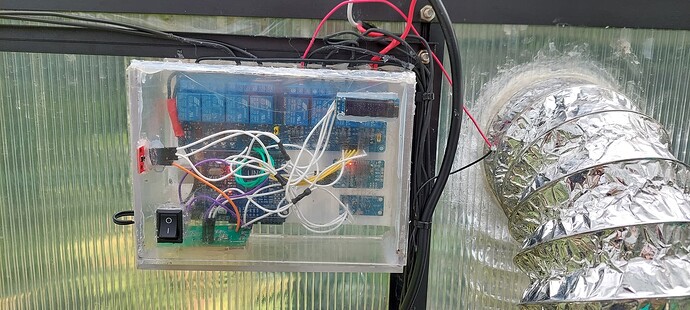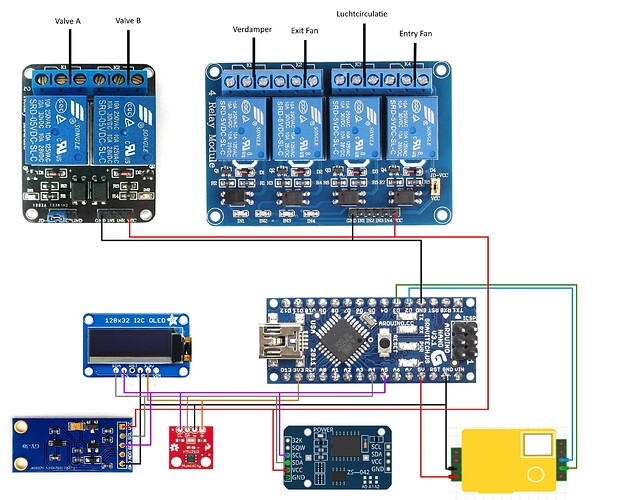Okay, well.
It worked perfectly fine for the OLED display alone, but now that i have integrated it to the full code, the SSD_State doesn't change anymore.
Other functions, like humidity and fan don't switch on or off at the right time.
Everytime worked perfectly when tested seperatly, so its not a hardware problem.
Here's the full code:
#include <BH1750.h>
#include <SoftwareSerial.h>
#include <MHZ.h>
#include <Wire.h>
#include <Adafruit_GFX.h>
#include <Adafruit_SSD1306.h>
#include "SparkFunHTU21D.h"
#include <DS3231.h>
HTU21D myHumidity;
DS3231 rtc(SDA, SCL);
BH1750 lightMeter;
MHZ co2(6, MHZ14A);
Time t;
#define SCREEN_WIDTH 128 // OLED display width, in pixels
#define SCREEN_HEIGHT 32 // OLED display height, in pixels
Adafruit_SSD1306 display(SCREEN_WIDTH, SCREEN_HEIGHT);
unsigned long prevTime = 0;
int SSD_State = 0;
void setup() {
Serial.begin(9600);
myHumidity.begin();
rtc.begin();
lightMeter.begin();
display.begin(SSD1306_SWITCHCAPVCC, 0x3C);
display.clearDisplay();
display.setTextColor(SSD1306_WHITE);
pinMode(2, OUTPUT); // R2.4 Verdamper
pinMode(3, OUTPUT); // R2.3 Exit Fan
pinMode(4, OUTPUT); // R2.2 Luchtcirculatie
pinMode(5, OUTPUT); // R2.1 Entry Fan
pinMode(6, INPUT); // PWM CO2 Meter
pinMode(10, OUTPUT); // R1.4 -
pinMode(11, OUTPUT); // R1.3 -
pinMode(12, OUTPUT); // R1.2 -
//RTC Instellen van de TIJD
rtc.setDOW(FRIDAY); // Set Day-of-Week to SUNDAY
rtc.setTime(15, 10, 50); // Set the time to 12:00:00 (24hr format)
rtc.setDate(5, 5, 2023); // Set the date to January 1st, 2014
}
void loop() {
t = rtc.getTime();
int ppm_pwm = co2.readCO2PWM();
float lux = lightMeter.readLightLevel();
float humd = myHumidity.readHumidity();
float temp = myHumidity.readTemperature();
Serial.println(SSD_State);
if (millis() - prevTime >= 5000) {
SSD_State = (SSD_State+1)%5;
Serial.println(SSD_State);
prevTime = millis();
}
// display time
if (SSD_State == 0){
display.clearDisplay();
display.setTextSize(1);
display.setCursor(0,0);
display.print("Tijd:");
display.setTextSize(3);
display.setCursor(12,11);
display.print(t.hour);
display.setCursor(42,11);
display.print(":");
display.setCursor(54,11);
display.print(t.min);
display.display();
}
// display temperature
if (SSD_State == 1) {
display.clearDisplay();
display.setTextSize(1);
display.setCursor(0,0);
display.print("Temperatuur:");
display.setTextSize(3);
display.setCursor(12,11);
display.print(temp);
display.print(" ");
display.setTextSize(1);
display.setCursor(105,13);
display.cp437(true);
display.write(167);
display.setTextSize(2);
display.print("C");
display.display();
}
// display humidititty
if (SSD_State == 2){
display.clearDisplay();
display.setTextSize(1);
display.setCursor(0,0);
display.print("Luchtvochtigheid:");
display.setTextSize(3);
display.setCursor(12,11);
display.print(humd);
display.print(" ");
display.setTextSize(1);
display.setCursor(105,13);
display.setTextSize(2);
display.print("%");
display.display();
}
// Display CO2
if (SSD_State == 3){
display.clearDisplay();
display.setTextSize(1);
display.setCursor(0,0);
display.print("CO2 gehalte:");
display.setTextSize(3);
display.setCursor(12,11);
display.print(ppm_pwm);
display.display();
}
// Display Light intensity
if (SSD_State == 4){
display.clearDisplay();
display.setTextSize(1);
display.setCursor(0,0);
display.print("Lichtintensiteit:");
display.setTextSize(3);
display.setCursor(12,11);
display.print(lux);
display.display();
}
///////////////////////////////////////////////////////////////////////////////////////////////////////////////////////////////////////////////////////////////////////////////////////////////
//\\\\\\\\\\\\\\\\\\\\\\\\\\\\\\\\\\\\\\\\\\\\\\\\\\\\\\\\\\\\\\\\\\\\\\\\\\\\\ EFFECTIEVE REGELING >\\\\\\\\\\\\\\\\\\\\\\\\\\\\\\\\\\\\\\\\\\\\\\\\\\\\\\\\\\\\\\\\\\\\\\\\\\\\\\\\\\\\\\\\//
///////////////////////////////////////////////////////////////////////////////////////////////////////////////////////////////////////////////////////////////////////////////////////////////
// Luchtbevochter
if(lux >= 100) { //Aanschakelen aan de hand van LICHTSTERKTE
if(humd <= 78){
digitalWrite(2, LOW);
}
if(humd >= 82){
digitalWrite(2, HIGH);
}
else{
digitalWrite(2, HIGH);
}
}
// Entry Fan
if(lux >= 100){
digitalWrite(5, LOW);
}else{
digitalWrite(5, HIGH);
}
// Exit Fan
if(temp >= 29.0 || humd >= 85){
digitalWrite(3, LOW);
}else {
digitalWrite(3, HIGH);
}
// Luchtcirculatie ventilator
if(lux >= 100){ //Tijd wanneer ventilator aanstaat
digitalWrite(4, LOW);
} else{
digitalWrite(4, HIGH);
}
}

